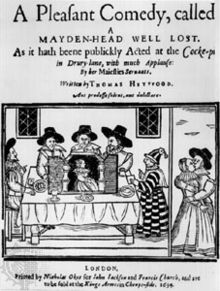
Thomas Heywood Excerpt from "Apology for Actors" (1612)

Thomas Heywood (1574–1641) was a leading dramatist in England who claimed to have written over 200 plays. In response to Puritan criticism of the stage, Heywood suggests here that the stage can both delight and teach.
...What is, then, the subject of this harmless mirth? Either in the shape of a clown to show others their slovenly and unhandsome behaviour, that they may reform that simplicity in themselves which others make their sport; else it entreats of love, deriding foolish inamorates, who spend their ages, their spirits, nay, themselves, in the servile and ridiculous employments of their mistresses. And these are mingled with sportful accidents, to recreate such as of themselves are wholly devoted to melancholy, which corrupts the blood, or to refresh such weary spirits as are tired with labour or study, to moderate the cares and heaviness of the mind, that they may return to their trades and faculties with more zeal and earnestness after some small, soft and pleasant retirement.
Sometimes they discourse of pantaloons, usurers that have unthrifty sons, which both the fathers and sons may behold to their instructions: sometimes of courtezans, to divulge their subtleties and snares in which young men may be entangled, showing them the means to avoid them. If we present a pastoral; we show the harmless love of shepherds diversely moralised, distinguishing between the craft of the city and the innocency of the sheepcote.
Briefly, there is neither tragedy, history, comedy, moral or pastoral, from which an infinite use cannot be gathered. I speak not in the defence of any lascivious shows, scurrilous jests or scandalous invectives. If there be any such, I banish them quite from my patronage.
...In the time of my residence in Cambridge, I have seen tragedyes, comedyes, historyes, pastorals, and shewes, publickly acted, in which the graduates of good place and reputation have bene specially parted. This it held necessary for the emboldening of their junior schollers to arme them with audacity against they come to bee employed in any publicke exercise, as in the reading of the dialecticke, rhetoricke, ethicke, mathematicke, the physicke, or metaphysike lectures. It teacheth audacity to the bashfull grammarian, beeing newly admitted into the private colledge, and, after matriculated and entred as a member of the University, and makes him a bold sophister, to argue pro et contra to compose his syllogysmes, cathegoricke, or hypotheticke (simple or compound), to reason and frame a sufficient argument to prove his questions, or to defend any axioma, to distinguish of any dilemma, and be able to moderate in any argumentation whatsoever.
To come to rhetoricke: it not onely emboldens a scholler to speake, but instructs him to speake well, and with judgement to observe his commas, colons, and full poynts; his parentheses, his breathing spaces, and distinctions; to keepe a decorum in his countenance, neither to frowne when he should smile, nor to make unseemely and disguised faces in the delivery of his words; not to stare with his eies, draw awry his mouth, confound his voice in the hollow of his throat, or teare his words hastily betwixt his teeth; neither to buffet his deske like a mad man, nor stande in his place like a livelesse image, demurely plodding, and without any smooth and formal motion. It instructs him to fit his phrases to his action, and his action to his phrase, and his pronuntiation to them both.
Tully, in his booke Ad Caium Herennium, requires five things in an orator—invention, disposition, eloquution, memory, and pronuntiation; yet all are imperfect without the sixt, which is action, for be his invention never so fluent and exquisite, his disposition and order never so composed and formall, his eloquence and elaborate phrases never so materiall and pithy, his memory never so firme and retentive, his pronuntiation never so musicall and plausive, yet without a comely and elegant gesture, a gratious and a bewitching kinde of action, a naturall and familiar motion of the head, the hand, the body, and a moderate and fit countenance sutable to all the rest, I hold all the rest as nothing. A delivery and sweet action is the glosse and beauty of any discourse that belongs to a scholler. And this is the action behoovefull in any that professe this quality, not to use any impudent or forced motion in any part of the body, nor rough or other violent gesture; nor on the contrary to stand like a stiffe starcht man, but to qualifie every thing according to the nature of the person personated: for in overacting trickes, and toyling too much in the anticke habit of humors, men of the ripest desert, greatest opinions, and best reputations, may breake into the most violent absurdities.